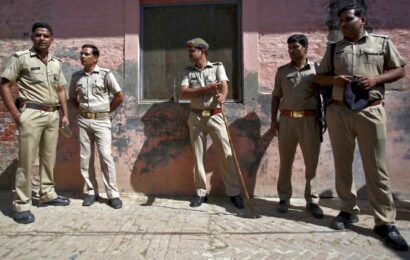The longest-serving Bharatiya Janata Party chief minister and popularly known as mama (maternal uncle) and ‘paon-paon wale bhaiya‘ (foot soldier), Shivraj Singh Chouhan has emerged as the hero of his party’s stunning victory in the state assembly elections.
The 64-year-old politician sought to turn the tables in BJP’s favour in Madhya Pradesh by launching a game-changer scheme like ‘Ladli Behna’ to beat anti-incumbency, though his party had refrained from projecting him as the CM face in last month’s assembly elections.
In March 2020, when the Congress government collapsed after a coup by the current civil aviation minister Jyotiraditya Scindia and MLAs loyal to him, Chouhan, despite his party losing polls by a whisker in 2018, retained confidence of the BJP whose central leadership chose him the chief minister for a fourth term.
The BJP contested the November 17 assembly polls mainly using the aura of Prime Minister Narendra Modi, but Chouhan, who took over as the CM at the age of 46 in 2005, remains a formidable contender for the top post among a crowded pool of aspirants after the saffron party retained power in the state.
Having a carefully cultivated image of a family man coupled with simplicity, Chouhan was at the forefront of campaigning, presenting himself as one among people and promising further development besides coming out with populist welfare schemes, especially for women.
Assiduously working on his ‘son of the soil’ image, the soft-spoken leader easily identified himself with socio-economic concerns of farmers, villagers, women and youngsters.
Chouhan in March launched the Ladli Behna scheme, which provides eligible women Rs 1,250 monthly financial assistance, and later promised to gradually hike the amount to Rs 3,000.
Speaking about the scheme, seen as a game-changer, during the campaigning, Chouhan, in his rustic style, remarked It has raised the stature of women in the household and now even mothers-in-law offers rotis spread with ghee (ghee-chupdi rotis) to their daughters-in-law.
“The scheme has made women self-reliant. It has paid rich dividends to the party. In 2018, the turnout of women voters was 74.22 per cent, which in 2023 rose to 76.25, a rise of little over 2 per cent. It is believed females have voted in large numbers in favour of the BJP,” claimed state BJP secretary Rajneesh Agrawal.
He informed that the women voters’ turnout increased in 182 assembly seats, out of the total 230, this year.
Chouhan, who won the November 17 assembly elections this year by a margin of over one lakh votes from Budhni in Sehore district, has largely maintained a low-profile and remained focused on MP’s development.
The BJP garnered 109 seats in the 230-member assembly in 2018, while its tally was 163 in the 2013 polls.
In the results declared Sunday, the BJP is poised to get 164 seats.
The saffron party’s best-ever score was in 2003, the first assembly polls to be held after Chhattisgarh was carved out of Madhya Pradesh, when it won 173 seats under the leadership of firebrand BJP leader Uma Bharti.
During his nearly 18-year-long tenure as CM, barring 15 months of Congress rule (December 2018-March 2020), Chouhan transformed himself from being a shy, simple and vulnerable politician to an astute leader with a wide mass appeal.
This time, the ruling party fielded seven Lok Sabha members, including Union ministers Narendra Singh Tomar, Faggan Singh Kulaste and Prahlad Patel, and general secretary Kailash Vijayvargiya.
The move sent out signals that the BJP has kept options open for the top post and Chouhan may not be the automatic choice if the party retains the state.
Despite not getting an open endorsement from the central leadership for the CM post, the BJP leader put his heart and soul into campaigning where he often got emotional during his speeches.
Speaking at an event in early October on his home turf Budhni, Chouhan turned emotional and told the women in the gathering they would never get a ‘brother’ like him and would miss him when he is not around. This led to speculation of him being sidelined in the party.
In the last phase of canvassing, Chouhan addressed as many as 13 poll meetings in a day, while the count was minimum 10 on other days after the election schedule was announced. In contrast, his main rival and former chief minister Kamal Nath of the Congress addressed 2 to 4 rallies in a day.
Though the opposition Congress linked Chouhan to the multi-crore Vyapam scam, he emerged unscathed. The Central Bureau of Investigation (CBI) gave a clean chit to Chouhan.
The Vyapam scandal was an entrance examination, admission and recruitment scam that was unearthed in 2013. It involved politicians, senior and junior officials and businessmen systematically employing imposters to write papers, manipulate exam hall seating arrangements and supply forged answer sheets by allegedly bribing officials.
Born on March 5, 1959 to Prem Singh Chouhan and Sundar Bai in a farming family in village Jait in Sehore district, Shivraj singh Chouhan got associated with the Rashtriya Swayamsevak Sangh (RSS) when he was just 13.
His leadership skills first came to the fore when he was elected president of the Model Higher Secondary School Students’ Union in 1975.
Chouhan participated in the movement against Emergency and was imprisoned in 1976-77 and also on many other occasions for political agitations and public causes.
A volunteer of the RSS since 1977, Chouhan is a gold medallist in Masters of Philosophy from the Barkatullah University in Bhopal.
Chouhan replaced BJP leader Babulal Gaur as chief minister on November 29, 2005, and remained in the saddle till the party’s defeat at the hustings in 2018.
He bounced back in March 2020 as the chief minister for a fourth term after the dramatic collapse of the Kamal Nath government.
He also served as general secretary of the BJP and president of the party’s MP unit.
Chouhan first entered the state assembly in 1990 after winning from the Budhni seat.
He was elected to the Lok Sabha for the first time from the Vidisha constituency the following year. He was re-elected to the Lower House of Parliament from the seat in 1996, 1998, 1999 and 2004. He won his fifth Lok Sabha election with an impressive margin of over 2,60,000 votes.
The rapidly rising BJP star briefly suffered a setback in 2003 when he lost to incumbent chief minister Digvijaya Singh of the Congress from the Raghogarh assembly seat. In the elections held that year, the BJP stormed to power and Uma Bharti became chief minister.
Soon, Bharti resigned and Gaur became the CM in 2004, only to be replaced by Chouhan the next year.
Chouhan pioneered welfare schemes in Madhya Pradesh, which was once tagged among the ‘BIMARU’ (laggard) states. His populist programmes like ‘Ladli Laxmi Yojna’, ‘Mukhya Mantri Kanyadan Yojna’, ‘Mukhya Mantri Teerth Darshan Yojna’, bicycle scheme for school children, among others, were emulated by some other states.
Under his leadership, the state became self-dependent in power and companies had been supplying uninterrupted electricity for 24 hours to non-farm consumers and 10-hour dedicated supply for agriculture-related activities.
Chouhan’s leadership also saw Indore getting the “cleanest city” award under the Centre’s ‘Swachh Bharat Abhiyan’ for a record seven times in a row.
In his fourth term, Chouhan projected himself as an environment-friendly chief minister and often started his day by planting a sapling in Bhopal and other parts of the state.
Source: Read Full Article


